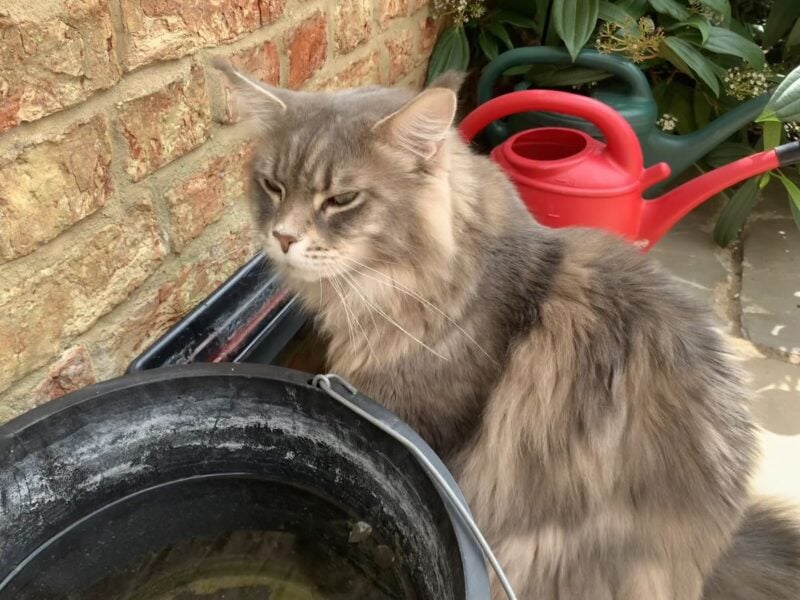Domestic Longhair Vs. Maine Coon: Which Fluffy Giant Deserves Your Heart?

When choosing between a Domestic Longhair and a Maine Coon, you’re deciding which kind of majestic fluff fits your home – one being an unpredictable mixed-breed cuddle bug, the other a regal, gentle giant steeped in history!
Let’s explore each aspect in depth so you can make an informed choice.
Origins And Ancestry
Domestic Longhairs are simply longhaired mixed-breed cats with no strict lineage. They have evolved across generations from various domestic cats, inheriting a wide array of temperaments and looks.
This rich genetic diversity means there’s no telling exactly what personality or appearance you’ll get; each Domestic Longhair is therefore unique!
On the other hand, Maine Coons are a recognized breed with a well-documented ancestral story.
Native to Maine, USA, they are believed to be descendants of shorthaired domestic cats accidentally brought by ships, interbreeding with local cats.
Over time, the Maine Coon naturally developed its signature thick coat, tufted ears, and bushy tail to withstand harsh winters. Today’s Maine Coons still carry those survival traits.
Lifespan And Health Considerations
Both Domestic Longhairs and Maine Coons have comparable life expectancies, generally living between 12 and 15 years with proper care. However, their health risks differ slightly due to size and genetics.
Maine Coons, being large and muscular, are more prone to conditions like:
Responsible breeders will screen breeding cats for these issues, and ongoing vet check-ups can catch concerns early.
By comparison, Domestic Longhairs typically share fewer breed-specific health problems, but their genetic mix means unexpected health challenges can arise, though they benefit from robust hybrid vigor.
Coat Types And Grooming Needs
Both cats feature long fur, but the texture and grooming needs differ significantly.
Maine Coons possess a double coat – a soft, insulating underfur and a water-resistant guard coat, designed for winter survival.
Their fur forms a ruff around the neck and a dense plume on the tail, giving them a regal presence.
To avoid mats and tangles, they require brushing three to four times a week and perhaps a gentle wash every few months.
By comparison, Domestic Longhairs can have single or double coats, with texture varying from silky to thick.
Their grooming regimen depends on individual coat characteristics and may range from weekly brushing to more frequent care.
Bathing is less often required but helpful for maintaining clean fur and reducing shedding.
Temperament And Personality
If you desire predictability and feline companionship patterned by centuries of breeding, look to the Maine Coon. They are consistently:
- Friendly
- Intelligent
- People-oriented
They are often likened to dogs in loyalty and trainability. Many enjoy:
Their slow-growing nature contributes to a calmer demeanor, although they remain playful well into adulthood.
By comparison, Domestic Longhairs can be anything:
- The affectionate lap cat
- The aloof observer
- The energetic explorer
They’re a wildcard!
That unpredictability may thrill owners who enjoy discovering completely individual personalities.
Physical Appearance And Size
Here is a simple comparison table that highlights the Maine Coon Vs Domestic Longhairs differences:
| Feature | Domestic Longhair | Maine Coon |
|---|---|---|
| Size | Medium–large, variable | Large, males: 18-21 lbs; females: 12-15 lbs |
| Body Shape | Mixed builds from ancestor cats | Rectangular, muscular, robust |
| Ears & Tail | Standard ears, long tail | Tufted “lynx tips,” plume-like tail |
| Head & Eyes | Varies widely | Broad head, expressive eyes, strong muzzle |
Maine Coons are unmistakably grand in stature, making them stand out in any crowd.
Domestic Longhairs vary considerably, so selecting one means choosing based more on personality than on appearance.
Care Needs And Lifestyle Fit
Domestic Longhairs tend to be more forgiving regarding grooming, feeding, and physical activity, making them ideal for busy households or first-time cat owners.
They require regular vet visits, a healthy diet, playtime, and some affection, but their overall demands are manageable.
By comparison, Maine Coons, with their majestic size and double coats, bring more commitment.
Owners should invest in proper nutrition rich in protein to support their big bodies.
Cardiac and hip screening exams may be necessary, as well as large litter boxes and durable toys.
They thrive in homes where they’re treated like family members, with daily interaction, even play outside on a harness, and structured care.
Making The Right Choice
Choosing between a Domestic Longhair and a Maine Coon comes down to understanding your lifestyle and what matters most to you.
If you want a beautifully large, family-oriented, and interactive cat and are willing to invest in grooming and healthcare, the Maine Coon is a spectacular companion.
If you prefer lower-maintenance fluff with a surprise personality and unique charm, a Domestic Longhair might be your perfect match.
No matter which path you take, both breeds offer joy, affection, and the captivating presence only a longhaired feline can deliver.






